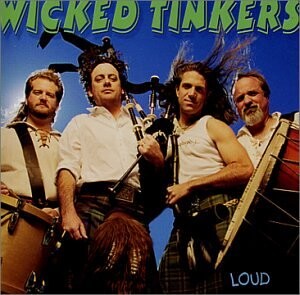 I would love to hear what the comedian and once upon-a-time folk singer Billy Connolly would have to say about the playing of the Corn Na Lliran (Bronze Age Irish horn) and didgeridoo on the aptly named opening track ‘Bog’ from Wicked Tinkers album Loud. Because you see, on this side of the pond the word bog is often used to refer to the toilet! Now don’t let this put you off the album. For although I thought the horn part was a bit too long, and I was just about to hit the fast-forward button, when the Highland bagpipes and drums set in my confidence was restored. You might say the hairs on the back of my neck stood on end and I found myself reaching for my Claymore, just to kill off a few more sassenachs. For make no mistake about it, this is real sterling music!
I would love to hear what the comedian and once upon-a-time folk singer Billy Connolly would have to say about the playing of the Corn Na Lliran (Bronze Age Irish horn) and didgeridoo on the aptly named opening track ‘Bog’ from Wicked Tinkers album Loud. Because you see, on this side of the pond the word bog is often used to refer to the toilet! Now don’t let this put you off the album. For although I thought the horn part was a bit too long, and I was just about to hit the fast-forward button, when the Highland bagpipes and drums set in my confidence was restored. You might say the hairs on the back of my neck stood on end and I found myself reaching for my Claymore, just to kill off a few more sassenachs. For make no mistake about it, this is real sterling music!
So who are the Wicked Tinkers? Virtually unheard of on my side of the pond. Well, this is the band’s third album, and they are: Aaron Shaw on Highland bagpipes, Scottish small pipes, chanter, trump (jaw harp), and vocals; Wayne Belger on Bronze Age Irish horn, bodhran and backing vocals; Warren Casey makes up half of the thumping and banging department on bass tapan, bodhran, darabukka, whistle, and backing vocals; along with Keith Jones on snare drums, djembe, bongos, timbale and backing vocals. All of them hail from the Los Angeles, California. Recording them must have been a technical nightmare, but Scott Fraser at Architecture in L.A. has done a good job.
On this album you have what the Wicked Tinkers call Gaelic bagpipe music, not the refined playing of a normal pipe band, but their own version of what the ancient tribal bands might have been like. It’s the sort of sound you might have heard at Scottish weddings, ceilidhs, or around the campfires of a highland raiding party. Before playing the album, on reading the sleeve notes, I wondered how the hell they could make an album consisting of a bent piece of Irish plumbing (that does not even have a mouth piece!), Highland bagpipes and some drums even remotely entertaining to anyone other than a Scotsman. Well I am here to tell you they have! The repertoire depends mainly on tunes from the Scottish Highlands. Jigs and reels, strathspeys, marching and battle tunes, mixed in with some Irish reels and a slow aire, plus a lament. There is just one song on the album, ‘I Will Go’, blended in with the tune to ‘Hey Johnny Cope’. The set comes to an end with the funeral march “Lochaber No More.”
The eponymous track “Wicked Tinkers” is a set of four tunes consisting of a couple of contemporary works such as “Farewell to Whiskey” by Michael Mullen and “The Wicked Tinkers” and “Donald Varella’s Jig” named after the author. “Percussion Suite” after a fade-in, has what I think is a short song by Warren in Macedonian or Bulgarian, but whatever it is, it sounds okay.
I am the first to admit that bagpipes may not be to everybody’s taste, but I defy anyone to keep their feet still when the penultimate “Reel Jam” kicks in after “Piobaireachd” (lament for Donald Duaghal MacKay, trad). It is a collection of favorites like “Sleepy Maggie,” “Sugar Merchant,” “High Road to Linton,” “Jock Wilson’s Ball” and more. But of course the album has to end with a set headed by “Flower of Scotland” by Roy Williamson and the traditional tune “Black Bear,” two of my all time favourites!
When in Edinburgh, I once asked a similar sounding band “Where do you practice?” their reply was “Och, never the same place twice!” If you are a fan of Deaf Shepherd or such like, you must get this album. Wicked Tinkers are obviously fun loving guys and have produced a great album here. Even if you think you do not like pipe music, this could well change your mind. Pour yourself a glass of single malt Scotch whiskey, sit back and let the music sink in.
(Thistle Pricks, 2002)
